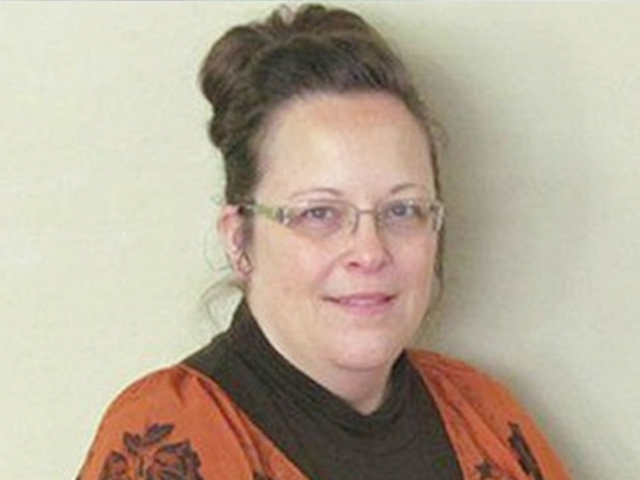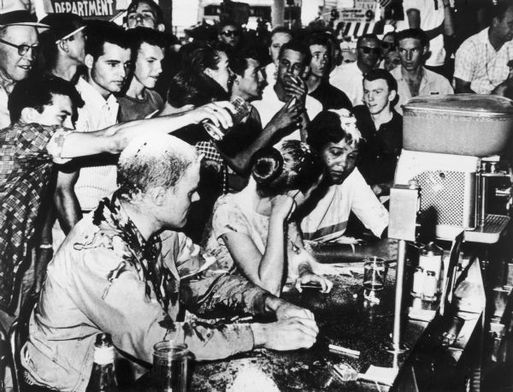 The latest battle in the gay marriage debate: I'm sure you know the story. Kim Davis is the county clerk in Rowan County, Kentucky. Since the Obergefell decision, she has refused to hand out any marriage permits to either gays or straights, nor to authorize her deputies to do the same. She's now been held in contempt of court and thrown in jail.
The latest battle in the gay marriage debate: I'm sure you know the story. Kim Davis is the county clerk in Rowan County, Kentucky. Since the Obergefell decision, she has refused to hand out any marriage permits to either gays or straights, nor to authorize her deputies to do the same. She's now been held in contempt of court and thrown in jail.These confrontations have become more and more common as the American government begins to tackle the gay marriage issue. Post-Obergefell, there's no reason to imagine the numbers will go down. Kim Davis is merely an opening skirmish.
As per usual when these issues surface, my immediately appeal for guidance is to historical cases I admire. Above all, I think of my favorite meditation on religious freedom, the film A Man for All Seasons, which examines the conflict between personal conscience and obeying the government.
Sir Thomas More was chancellor of England when King Henry VIII decided to amend the law, dissolve his own marriage, separate from the church of Rome, and declare himself lord over the newly-established Anglican church. More - a devout Catholic - heartily objected to the king's decision, but was aware of the danger of saying so. Instead, he resigned his post.
But the king would not stop there. He knew the importance of More's endorsement, and so invaded More's private life, determined to win his approval, and if he could not win it, then to obtain it by force.
Kim Davis and Thomas More were placed in similar situations, but handled them in different ways. There were three options:
1. Obey the law - breaking his/her conscience or:
2. Disobey the law, claiming it to be unlawful or:
3. Resign - removing him/herself from the equation
For obvious reasons, the first option was not possible, so Davis chose the second and More the third. And there's the rub. Which option is the correct approach? More describes his philosophy to his daughter in A Man for All Seasons:
But More's way wasn't the only way, even in his own time. Another notable person who refused to pledge was Bishop John Fisher. Unlike More, he refused to keep his head down, preaching openly against the king's actions - though he notably maintained a legal silence until he was entrapped, later.God made the angels to show Him splendor, as He made animals for innocence and plants for their simplicity. But Man He made to serve Him wittily, in the tangle of his mind. If He suffers us to come to such a case that there is no escaping, then we may stand to our tackle as best we can, and, yes, Meg, then we can clamor like champions, if we have the spittle for it. But it's God's part, not our own, to bring ourselves to such a pass. Our natural business lies in escaping. If I can take the oath, I will.
The issue of whether Kim Davis's actions are justified has the Christian blogosphere split. Should she follow the path of Thomas More or John Fisher? On the one side, Rod Dreher argues that the honorable way to deal with a situation in which one can no longer fulfill the functions of one's job is to resign. On the other, Douglas Wilson defends her, saying "Kim Davis is not just keeping herself from sinning, she is preventing Rowan County from sinning." She has the support of two presidential candidates: Mike Huckabee and Ted Cruz.
Clearly, those that claim that civil disobedience is always wrong have not given the matter serious thought. There are obvious situations in which to break the law is the only righteous thing to do (think about it folks, I'm sure some will come to mind.) In addition, the church has always held that man's laws do not trump God's. "When injustice becomes law, resistance becomes duty," wrote Thomas Jefferson, and SCOTUS's recent decision is blatantly unjust, and far more unlawful than anything Kim Davis has done.
Civil disobedience for moral reasons is not immoral. There is no hard and fast moral commandment for whether Kim Davis should break the law or resign her post (a moral case can be made each way), and therefore she must turn to other forms of reasoning to make the decision.
A helpful question: Of these two options, which furthers God's kingdom? Once again, both can yield fruit. It's unlikely that resigning would have produced the same media attention as Davis's chosen protest, and in this world, if it isn't on TV, it isn't happening. Her determination has forced us all to deal with the issue on a national level. That's a good thing. But on the other hand, her case is not a black-and-white, morally clear issue. Not only did she disobey the law, but she failed to accomplish a major function of her job, all the while refusing to allow her co-workers to follow their own consciences.
While I think it would be uncharitable to condemn Davis as merely desiring attention, dragging an unwinnable, messy case like this before the courts is at the very least unhelpful. There are other, better cases to fight for. Civil disobedience shouldn't be our last resort, but a deciding factor in whether we engage in it is the question of whether it is profitable for society. Do we actually want to change things, or merely have our fifteen seconds of fame? If we have no other choice, then of course we must be "the King's good servant, but God's first" - but while there is a chance to avoid this confrontation, and pressing the point would do no good, then "Our natural business lies in escaping."
And "escape" by resigning is exactly what I think Kim Davis should do. I admire her very much. I think the spectacle of a fairly new Christian standing up for her beliefs, alienating both her co-workers and her political peers (she's a Democrat), is a thing we see far too seldom. She is doing nothing wrong. But in this case, resignation is a better option.
With all that in mind, there's a third character in A Man for All Seasons that we would do well to remember. Thomas Cromwell: the power-mad government official who convicted both More and Fisher, trampling a dozen laws to do so.
 Much has been said about the inconsistency of chucking a small county clerk in prison when larger criminals go free. And to the victors on the other side of Obergefell I say: your revolution of love, based on a specious court decision, has resulted in a system which stoops to this behavior. And stoop is exactly the right word here. Instead of even attempting to find a middle way, a compromise between Kim Davis's faith and the SCOTUS ruling (as Ryan Anderson notes, North Carolina has done this, it's not impossible), a woman has been thrown into jail and slut-shamed by the self-styled defenders of tolerance.
Much has been said about the inconsistency of chucking a small county clerk in prison when larger criminals go free. And to the victors on the other side of Obergefell I say: your revolution of love, based on a specious court decision, has resulted in a system which stoops to this behavior. And stoop is exactly the right word here. Instead of even attempting to find a middle way, a compromise between Kim Davis's faith and the SCOTUS ruling (as Ryan Anderson notes, North Carolina has done this, it's not impossible), a woman has been thrown into jail and slut-shamed by the self-styled defenders of tolerance.Now even if jail is, as some argue, excessive, it is the legal penalty for her actions. But this didn't stop with jail. It extended to angry people asking her to her face: "What's the longest...that you've been married to someone?" and nasty, triumphant memes mocking her pre-Christian past circulating around the internet. There is no reason whatsoever to treat a woman this way. She's no picket-sign-waving Westboro Baptist, nor the greatest enemy of gay marriage. She's one person stepping out on a fledgling belief. She's one mild-mannered county clerk. And if a society decides the conscience of a small town lady is the great human rights disaster of our age, then our priorities have completely lost touch with reality.
Longish

This case probably fascinates me more as a lawyer than as a Christian, and I think the legal merits of her protest are far greater than the Christian ones. I do not, by the way, doubt her sincerity. She comes from a troubled background (which we have learned from the atrocious press coverage and Twitter calumny), and it seems that the church she has found is a particularly narrow one (KJV-only, for instance, I have read). Converts have a tendency to be zealous, and folk from hard backgrounds who believe their lives were pulled from the wreckage more so, especially when they convert to tightly disciplined churches, as she very well may have. As a county clerk, however, what could she do, after her conversion, with her numerous legal duties or even those solely pertaining to marriage licenses to ensure that she was not signing off on anything un-Christian? No doubt a good many marriages whose licenses she issued were of a questionable character. Owing to her zealousness and perhaps a certain simplicity, however, she's convinced that this is a divine mission. I'm not so convinced. Nevertheless, I think what she has done is of more legal or civic importance, even if those are not her stated motives.
ReplyDeleteThis whole thing brought to my mind an old case, and I went back through the case law all the way to 1811 for a memorable quotation from Dalrymple v. Dalrymple, which was itself paraphrasing the far more ancient source of Cicero: "Marriage … is the parent, not the child, of civil society …." The entire line of cases from the Consistory Court of London down through the late 20th century in America followed this logic. The Obergefell decision represents a shocking reversal. Civil society is now the parent, of a rather "test tube" variety no less, of marriage. Kim Davis isn't being asked to swear an oath of a religious character: she is being commanded to issue permission for a foundational transformation of civil society: a change in how the elemental unit of society is formed, recognized, and treated. How this distinguishes her, a purely secular official, from Sir Thomas More, an official of both religious and legal character, I'll leave to any readers to reflect on.
It's interesting to note too that authorizing her deputies would have been a meaningless gesture under the Kentucky statute. The law in Kentucky plainly states that it is the clerk and the clerk alone who issues the marriage license with one exception. So, even if she told her staff to issue the licenses (and in reality I doubt she personally handed over the paperwork in every case anyway), by law every license would still be from her. The exception, you ask? Under Kentucky Revised Statutes 402.240, in the absence of the county clerk, the county judge/executive is empowered to issue marriage licenses. So, all those reports saying her underlings are doing it? Quite mistaken. They may be doing the physical task, but by law, if the licenses are not being issued by her, they are being done in the name of the Rowan County Judge/Executive.
P.S.: Sophie Scholl's friend and fellow member of the White Rose Alexander Schmorell is an Orthodox martyr-saint.
P.P.S.: I don't think Kim Davis should have felt bound to resign, and I think most of the hubbub in the Christian blogosphere on this controversy is deranged and ill-informed (I'm a curmudgeon like that), but I don't think this is a conflict that a woefully fragmented Christendom has any hope of winning against the secular state and our current culture. We've gone from Cicero to Caligula is very few years. Civil society has no idea what it's doing to itself, and, frankly, most Christian cultures or sub-cultures have a very poor grasp of it too. Even a noble confessor like Kim Davis (and I am not without admiration for her tenacity) almost certainly doesn't really understand what's going on here.
Thanks for the comment - it well articulates some of the things I could sort of sense instinctively but not put into words. Particularly Kim Davis's approach to the whole thing. I didn't know many facts about her background or denomination, but I'm very familiar with the intransigence of a KJV-only Christian when challenged (rightly or wrongly), living as I do in the heart of the Bible Belt. She's obviously not approaching this from any historical Christian framework (I'd imagine this post would puzzle her very much), but from the dictates of a specific present-day influence.
DeleteBut all that said, yes, it's impossible to doubt her sincerity. She's being painted as some sort of evil monster (I found that video of people yelling at her very distasteful to watch), when her sin is relatively small. What's the worst that could happen? People have to go to the next county? They're treating it all as if Kim Davis is - single-handedly - preventing the entire nation's flow of "equality." I hate to see a vulnerable person like her pilloried and mocked.
The more I think about it (and after chatting with my dad on the topic), I'm also torn on resignation. But if she found it impossible to fulfill the obligations of her job, then I can't think of other options than resignation or resistance. That resistance seems to me to be futile and unwise, but I can't help but admire it.
It's particularly difficult dealing with this case as she has a public job rather than a private one. If she were a baker or a florist, I'd have no problem whatsoever backing her up.
P.S. I seem to remember reading that about Alexander Schmorell. I'm familiar with her story from the splendid movie from a few years back:
Deletehttps://www.youtube.com/watch?v=nXtC08tWxqA
Something I've since read has moved me to return and add one thing to my remarks. It seems that the marriage licenses are now being issued with no signatures at all (http://www.denverpost.com/news/ci_28757051/gay-couples-will-try-wed-defiant-clerk-sits). Even if they were being signed by the deputies, that would—since Kim Davis has not actually been removed from office—raise issues under state law of the validity of the licenses, as well as authority and liability of the deputies. That Denver Post article also reports that Judge Bunning, the Federal judge who issued the contempt citation, said that he had no opinion of the validity of the licenses and that the same-sex couples would have to take their chances.
ReplyDeleteI note all of this, though, to say that I don't think those issues, while they are actually legally sound concerns, will make any difference. My impression is that any further legal complications about the validity of these licenses or any marriages authorized by them will be ignored. It would be a remarkable thing if, after all of this has settled down a bit, anyone decided to go to court to challenge the validity of those licenses or marriages. And no one is bothering to follow the statute concerning issuance of licenses in the absence of the clerk. So, you see, despite the claims that Kim Davis is being jailed strictly owing to the letter of the law and her violation of it, we do tend to apply the letter of the law rather … selectively.
Mindblowing. All that talk about "rule of law." I mean, I guess I already knew this, but it still stopped me in my tracks. You couldn't make this stuff up.
DeleteOh, and P.S.: my own first exposure to the White Rose was when I was a German student and we watched Die Weiße Rose in class. It's been a while, but it seems to my memory that one's worth a look, if you're ever in the mood to revisit the cinema of those events.
ReplyDeleteI'll have to look up Die Weiße Rose - I'm always up for a movie. That said, it'll have its work cut out topping Sophie Scholl: Die letzten Tage (the film I linked to). It mostly consists of Sophie's interrogation, and it's an incredible piece of psychological suspense and screenwriting restraint. As I understand, much of the conversation comes right from the transcripts. And Julia Jentsch is luminous in the role. I can't praise her enough.
Delete